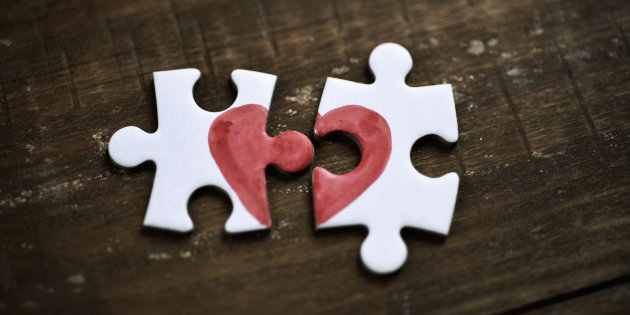Marriage: How to keep it off the Rocks
All praise be to Allah the Lord of the Universe. Peace and blessings be on His Messenger Muhammad
the Lord of the Universe. Peace and blessings be on His Messenger Muhammad  , his family and companions. Then, Allah
, his family and companions. Then, Allah said:
said:

And among His signs is this: He creates for you mates out of your own kind. So that you might find contentment (sukoon) with them, and He engenders love and tenderness between you: in this, behold, there are signs (messages) indeed for people who reflect (think!) [Rum: 21]
As I am sure you are aware, marriage in Islam is a legal contract. It is a contract between two people in the presence of witnesses the Best of whom is Allah  Himself before whom this contract is made and to whom the ones making the contract will be accountable. It is therefore essential that they understand what they are contracting to do. I recited before you an ayah (a verse) from the Qur’an where Allah
Himself before whom this contract is made and to whom the ones making the contract will be accountable. It is therefore essential that they understand what they are contracting to do. I recited before you an ayah (a verse) from the Qur’an where Allah  speaks about the institution of marriage, calls it one of His signs and mentions specifically three special features about this institution. He uses three critical words in this ayah:
speaks about the institution of marriage, calls it one of His signs and mentions specifically three special features about this institution. He uses three critical words in this ayah:
The first word Allah  used is the word Sukoon.
used is the word Sukoon.
Allah  said: And among his signs is this: He creates for you mates out of your own kind so that you may find sukoon with them. So what is sukoon? It is a word that we use in Urdu as well so I am sure all my friends who understand Urdu have an idea about its meaning. In Arabic sukoon is the opposite of Al – Haraka – or movement. In Arabic grammar the equivalent of the maatra on the letter is called Al-Haraka which tells us how the letter “moves” meaning, how it is to be pronounced. When there is a sukoon on the letter it means that the letter remains as it is and will not move and will be pronounced in its original form.
said: And among his signs is this: He creates for you mates out of your own kind so that you may find sukoon with them. So what is sukoon? It is a word that we use in Urdu as well so I am sure all my friends who understand Urdu have an idea about its meaning. In Arabic sukoon is the opposite of Al – Haraka – or movement. In Arabic grammar the equivalent of the maatra on the letter is called Al-Haraka which tells us how the letter “moves” meaning, how it is to be pronounced. When there is a sukoon on the letter it means that the letter remains as it is and will not move and will be pronounced in its original form.
Allah  has used the term sukoon as the first purpose of the marriage. He said that He creates mates for us so that we may find sukoon with them. So that we may find contentment with them. The first condition of the contract is that the spouses are undertaking to promise that they will henceforth lead their lives in such a way that they will make their companionship, their home, their being together and their support for one another a source of contentment and sukoon for each other. They are making Allah
has used the term sukoon as the first purpose of the marriage. He said that He creates mates for us so that we may find sukoon with them. So that we may find contentment with them. The first condition of the contract is that the spouses are undertaking to promise that they will henceforth lead their lives in such a way that they will make their companionship, their home, their being together and their support for one another a source of contentment and sukoon for each other. They are making Allah  a witness that henceforth they will not look elsewhere other than towards each other for all the requirements of marriage.
a witness that henceforth they will not look elsewhere other than towards each other for all the requirements of marriage.
That their eyes, ears, hearts, hands, feet will not stray away from their spouse. That there will be no Haraka, no movement away from the spouse. I ask Allah  to give them and all those who are here in this gathering, sukoon with their spouses. It also means that both will make an effort to create a home which is a place of sukoon which they look forward to returning to after having been away from it for various reasons.
to give them and all those who are here in this gathering, sukoon with their spouses. It also means that both will make an effort to create a home which is a place of sukoon which they look forward to returning to after having been away from it for various reasons.
The second word that Allah  has used in this ayah is: Al-Mawaddah: where He said: Wa ja’ala bainakum mawaddah: And He puts love between you. This refers to the love that the spouses feel for one another. This love is both physical and emotional. Love is an outcome of respect. We can’t love someone for whom we feel no respect. It is essential therefore for the spouses to pay attention to the good from each other and to forgive the mistakes. The spouses are like mirrors to each other. They reflect what they see but they have selective memory. When a new image comes before the mirror it is reflected with reference to the good from earlier images, whatever it was. Someone sent me a story which talked about writing the good about our friends in stone and writing their mistakes in the dust. One remains for a long time while the other is blown away by the first breeze that comes.
has used in this ayah is: Al-Mawaddah: where He said: Wa ja’ala bainakum mawaddah: And He puts love between you. This refers to the love that the spouses feel for one another. This love is both physical and emotional. Love is an outcome of respect. We can’t love someone for whom we feel no respect. It is essential therefore for the spouses to pay attention to the good from each other and to forgive the mistakes. The spouses are like mirrors to each other. They reflect what they see but they have selective memory. When a new image comes before the mirror it is reflected with reference to the good from earlier images, whatever it was. Someone sent me a story which talked about writing the good about our friends in stone and writing their mistakes in the dust. One remains for a long time while the other is blown away by the first breeze that comes.
I believe this is the single most important secret of a good marriage. To have this selective memory for the good and selective amnesia for the bad. Unfortunately many people have the opposite which is the root cause of all problems. The good is taken for granted as one’s right. While any mistake is seen as a premeditated crime and treated accordingly. Islam advises the opposite. To forgive not once but 70 times, without reservation.
For the spouse, his or her companion is their best friend. The marriage is a contract where the spouses are undertaking to make each other, their best friends from this day on. It is important to remember however that friendship is only as good as the amount of investment you make in it. It is not magic. It is not automatic. It does not happen. It is made. Consciously. With effort. And the results are directly proportional to the investment.
It is necessary to spend time with your spouse, not with your other friends in some club. It is necessary to develop common interests. It is necessary to take pleasure in each other’s work and activity. It is necessary to support each other in all that is good. It is necessary to ensure that you give feedback with care and concern and never in public. It is essential to remember that between spouses there are no defenses because there is trust. And for that reason it is essential for the spouses to exercise special care in dealing with each other’s emotions. It is necessary to build a language together, a language of looks, words, signs.
A language that over time becomes almost magical in how it enables one spouse to know what the other is feeling without explanation. A language which is a joy to see when you look at those who have been happily married for many years. It is necessary to consciously remember the good that one spouse does for the other, especially when they are having a bad day and are acting strange. This is the love that Allah talks about when He says that He has put it between the spouses. Like all potential wealth, it has to be accessed or it will remain buried under the sand.
talks about when He says that He has put it between the spouses. Like all potential wealth, it has to be accessed or it will remain buried under the sand.
The last word that Allah used in the ayah is Rahma: Mercy; when He said: Wa ja’ala bainakum mawadaatawn wa Rahma. Rahma is a special quality of Allah
used in the ayah is Rahma: Mercy; when He said: Wa ja’ala bainakum mawadaatawn wa Rahma. Rahma is a special quality of Allah Himself. It is the mercy that He shows to His creation even when they don’t deserve it.
Himself. It is the mercy that He shows to His creation even when they don’t deserve it.
He used this word to describe the relationship between the spouses in the marriage. We are merciful to those who we feel responsible for. We are merciful to our children whereas we may not exercise the same mercy for strange children. However when you are the teacher in a school the same children become your wards and you are merciful to them. The word Rahma in the context of marriage draws our attention to the responsibility that the spouses have for one another. It also draws attention to the fact that over the years each has made a lifetime’s investment in the other. To show Rahma – to be merciful – is to honor that investment and to thank the other for making it. Not to take this for granted. Rahma is also the quality when for reasons of life and destiny, when one of the spouses is unable to look after the other or to satisfy them, the other still treats him or her with love and respect and mercy. Rahma is to give without asking for return. To give because there is a pleasure in the giving itself.
Marriage in Islam is therefore a commitment made to each other, of integrity, love, respect and mercy that the spouses are undertaking to make to each other in the presence of Allah who is Witness to all our thoughts, intentions and actions.
who is Witness to all our thoughts, intentions and actions.
I ask Allah to bless this union, to fill the lives of these young people with His Mercy and to make them standard bearers of Islam in every sense of the term so that when they stand before Him on the Day when all of us will stand before Him, He will be pleased with them.
to bless this union, to fill the lives of these young people with His Mercy and to make them standard bearers of Islam in every sense of the term so that when they stand before Him on the Day when all of us will stand before Him, He will be pleased with them.
I ask the same dua for all of us.






